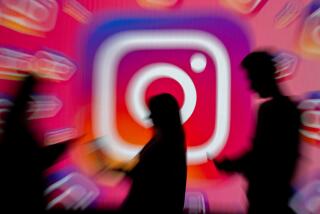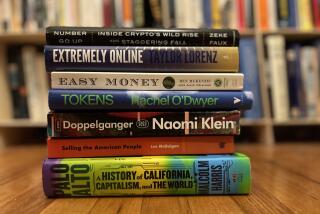In His Book, the Printed Word Will Live On
- Share via
For years now, the popularity of computers and the Internet and other computer networks has fueled speculation about the future of the printed word. Pundits ponder whether newspapers, magazines and books as we know them can survive beside their online counterparts.
A conference organized by Italian author Umberto Eco and Stanford University linguistics professor Geoffrey Nunberg in July 1994 at the University of San Marino in San Marino, Italy, sought to address this concern head-on by exploring the future of the book and reading. The conference proceedings generated the appropriately titled “The Future of the Book” (University of California Press, $14.95), which contains 11 essays from conference participants, as well as an afterword by Eco and an introduction by Nunberg, the book’s editor.
The Times talked to Nunberg--who, in addition to teaching, works as principal scientist at the Xerox Palo Alto Research Center--about the recently published collection and his own views on the book’s future.
*
Q: Has writing become trivialized since the introduction of the Net? That is, has it become more of a daily chore and less a reflection of a writer’s soul?
A: No. One of the things about the technology that’s interesting, and that Umberto Eco also points out in his afterword to this collection, is that the computer really does create a new environment for writing. We’re actually in a world where the written word has more importance than ever before--even replacing many of the conversations that used to take place over the phone with written conversations via e-mail.
One thing that’s striking is the degree to which people have had to relearn the conventions of letter writing that were very familiar in the 19th century, when a major city like London might have as many as five mail deliveries each day and people thought nothing of writing 15 letters a day.
*
Q: Do you think the new technology affects the way writers express themselves?
A: In a certain sense, yes. You certainly read articles in print now and you say to yourself, “This was sent in by e-mail.” You can just tell because there’s a loose quality to the prose, and, at times, there’s no connection between the opening sentence of the article and the following paragraphs.
On the other hand, when you go to the Web, you can see that a new form of writing is emerging there. It’s very pert; it’s very casual and informal; it’s very brief. It’s a sort of writing that’s almost too ephemeral for print. But on the Web it works very well. In fact, it works better than attempts to move the traditional writing forms like the novel or the classic print magazine onto the Web wholesale.
*
Q: Is this a transitional moment for the book, caught between old printing methods and new, digitalized ways of recording information?
A: There’s been so much concentration on the emergence of the digital media that people may tend to neglect the enormous importance of these technologies for the book itself, particularly for the sorts of publishing that have been relatively marginal in an economic sense but that bear a lot of the responsibility for print culture--literature, works of translation, poetry and small press and university press books.
Works of that sort are much easier to publish now than they used to be. That’s partly because of digital printing, which eliminates the economies of scale that are associated with offset printing; partly because it’s now possible to distribute books like that electronically and print them wherever they’re wanted--in a bookstore or a library, for example--and partly because the Web itself makes available an apparatus of publicity.
You never really know what the essence of a medium is until it’s in danger of being supplanted. In a certain sense, it wasn’t until the introduction of photography that we knew what painting was about.
In the same way, I think we’re beginning to learn what’s essential to the book as a kind of presentation. We already know, for example, that many of the things that have been printed in book form really have no essential reason to live in that form. Directories and parts catalogs, even encyclopedias, are much more efficient when you put them online. On the other hand, other kinds of books--the novel, history, critical writing and, to my mind, the dictionary, can’t be transformed to an electronic life without losing part of their essence.
*
Q: What do you think about the efforts of the MIT Media Lab and others to produce books that are made of super-thin, waterproof, flexible, electronic displays?
A: The idea is to create something essentially like paper that can bear a charge and display characters. My sense is that there are a lot of applications for which that kind of book would be very useful. But I think, again, it’s something that highlights certain properties of the traditional book that that sort of book wouldn’t have.
For example, when you read an ordinary bound-paper book, you have a sense of where you are in the text according to the distance between your thumb and forefinger. If it’s electronic paper, you only have a few pages.
That’s a wonderful advantage if you’re traveling on an airplane and you want to take 15 novels with you. But typically, when you’re reading a novel, you want to have this sense of moving from the first page of the book to the last. You want to have an almost subconscious sense of your place in the narrative according to the relative weight of the pages to the left and to the right.
That’s a crucial element of traditional reading that neither electronic paper nor an electronic screen can provide. This is not to say that we can’t have books in both forms. For instance, I want to have a copy of all of Jane Austen’s works online, so I can annotate them, or so I can efficiently search for a particular scene. But when it comes to sitting down and reading a Jane Austen novel from beginning to end, I want to have it in paper form.
You often hear it said that the book will vanish and be replaced by the screen. But it’s very rare that one technology wholly supersedes another. New possibilities for expression emerge with a new medium, but I don’t think there’s anything wrong with the traditional book.
*
Mary Purpura and Paolo Pontoniere can be reached via e-mail at pmpurpont@aol.com
More to Read
Sign up for our Book Club newsletter
Get the latest news, events and more from the Los Angeles Times Book Club, and help us get L.A. reading and talking.
You may occasionally receive promotional content from the Los Angeles Times.










